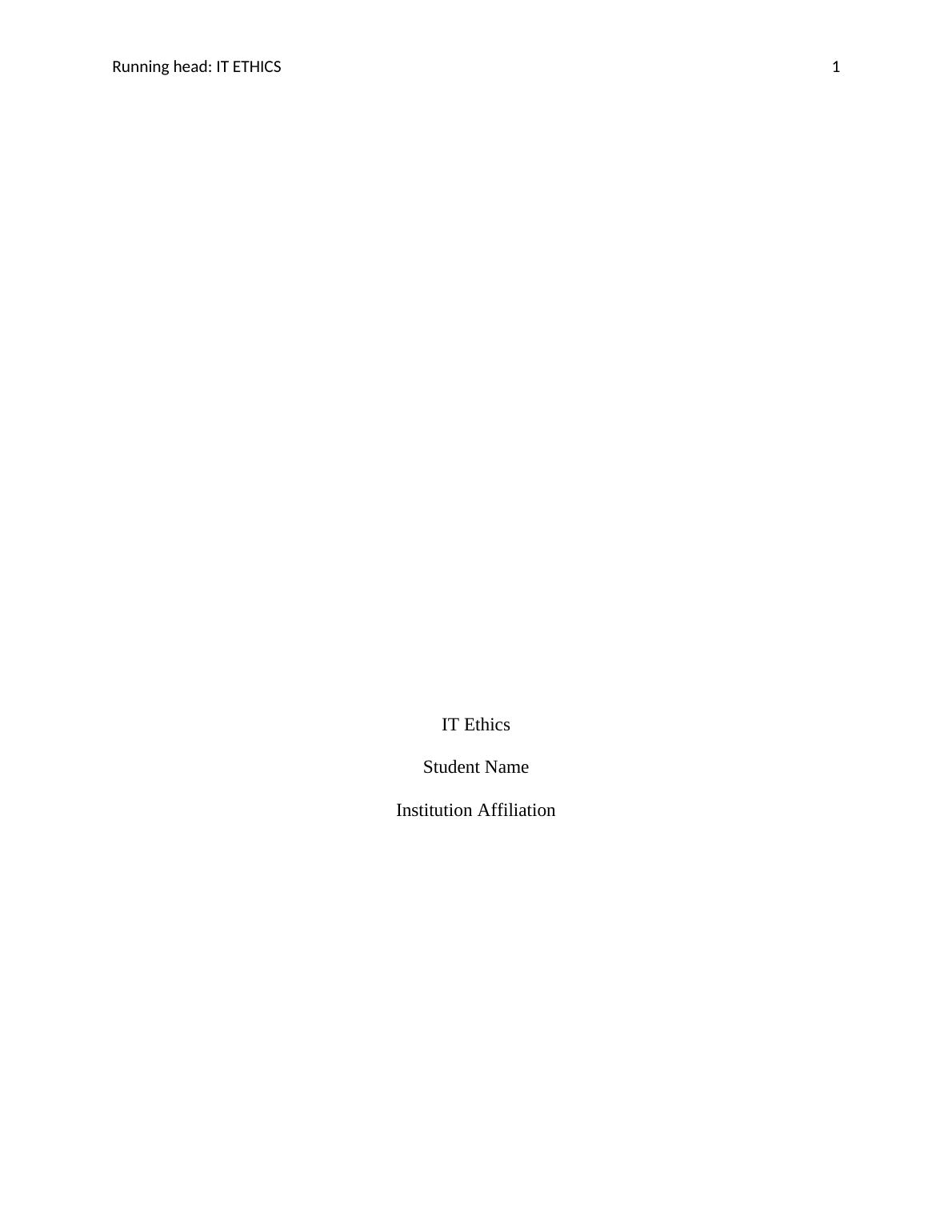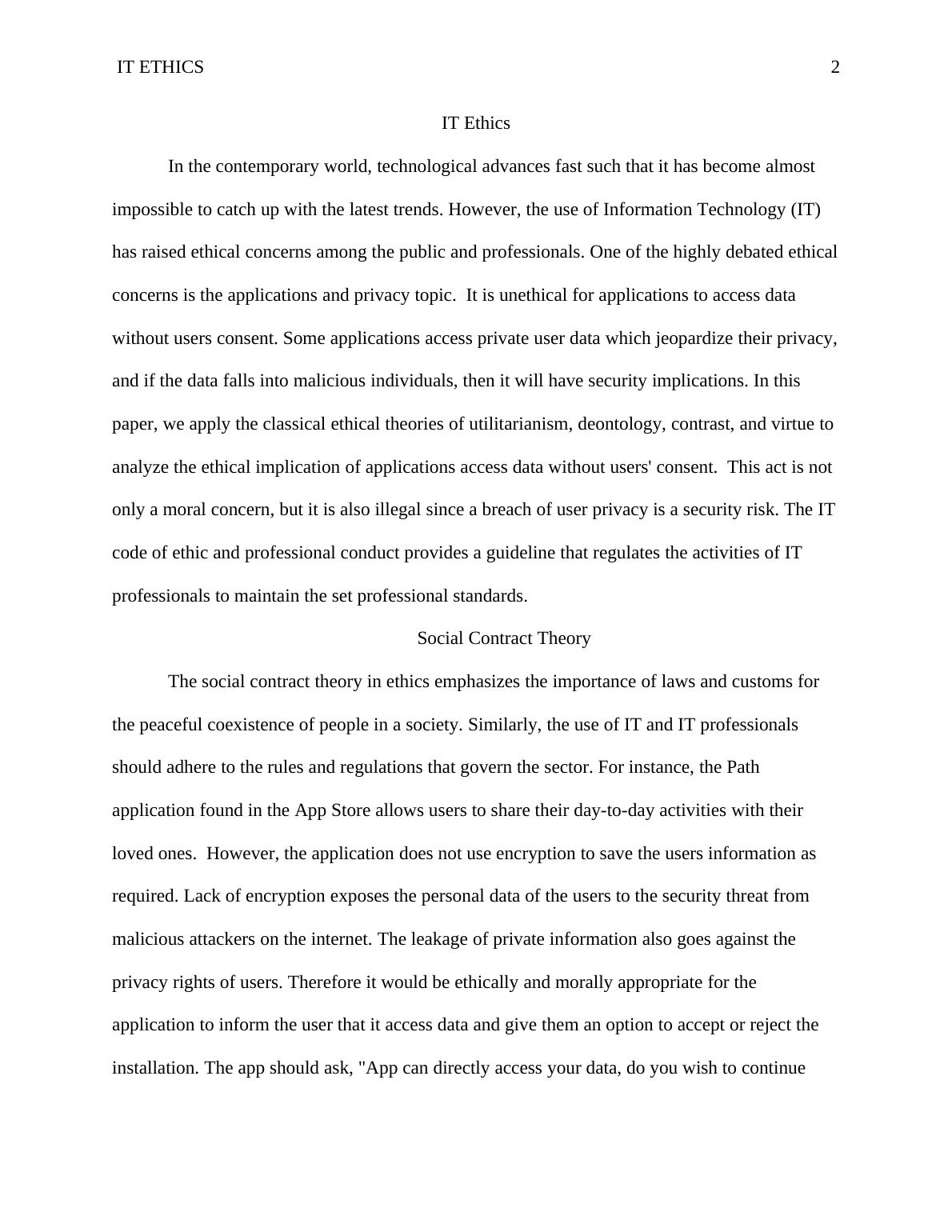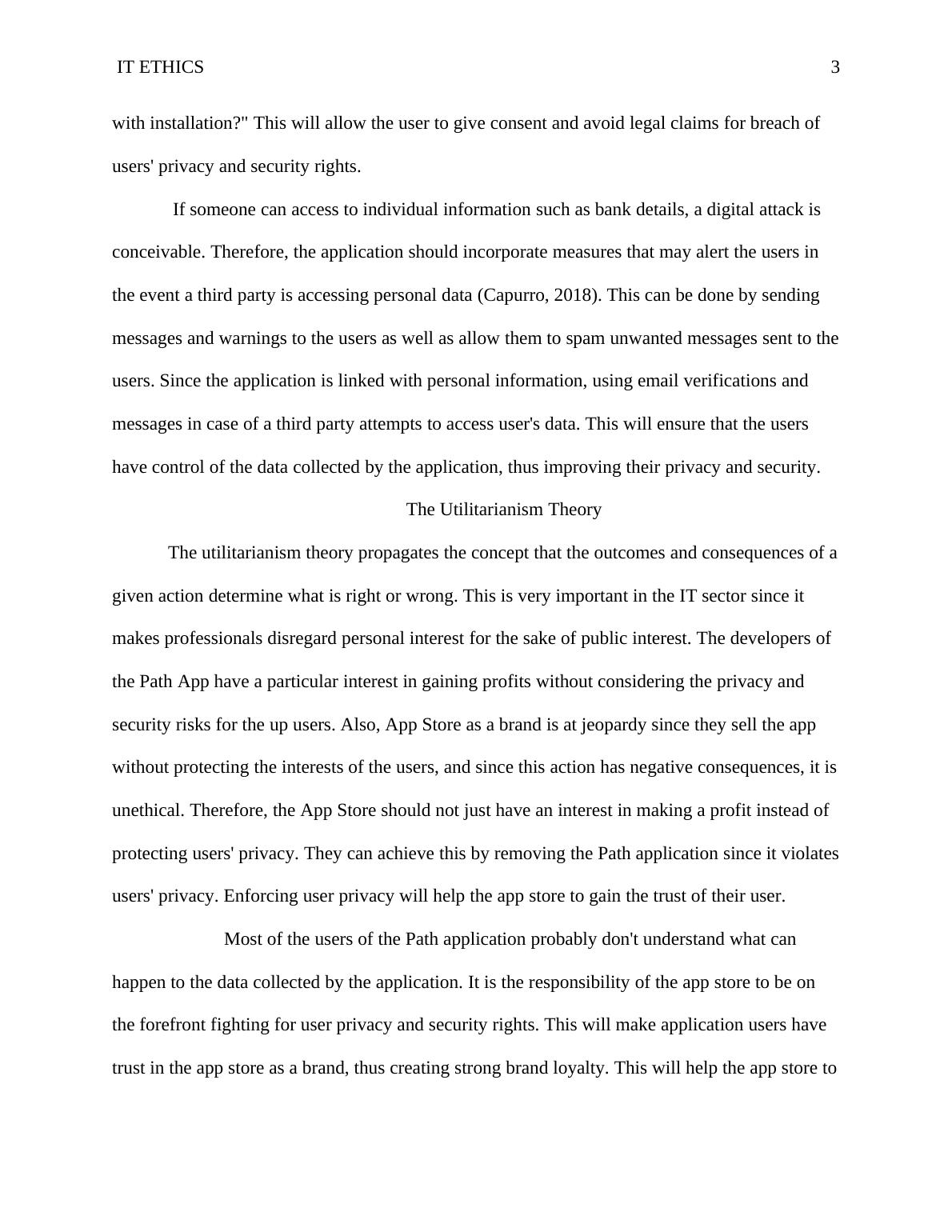IT Ethics: Analyzing the Ethical Implications of Application Accessing Data Without Users' Consent
Added on 2022-10-10
7 Pages1643 Words344 Views
Running head: IT ETHICS 1
IT Ethics
Student Name
Institution Affiliation
IT Ethics
Student Name
Institution Affiliation

IT ETHICS 2
IT Ethics
In the contemporary world, technological advances fast such that it has become almost
impossible to catch up with the latest trends. However, the use of Information Technology (IT)
has raised ethical concerns among the public and professionals. One of the highly debated ethical
concerns is the applications and privacy topic. It is unethical for applications to access data
without users consent. Some applications access private user data which jeopardize their privacy,
and if the data falls into malicious individuals, then it will have security implications. In this
paper, we apply the classical ethical theories of utilitarianism, deontology, contrast, and virtue to
analyze the ethical implication of applications access data without users' consent. This act is not
only a moral concern, but it is also illegal since a breach of user privacy is a security risk. The IT
code of ethic and professional conduct provides a guideline that regulates the activities of IT
professionals to maintain the set professional standards.
Social Contract Theory
The social contract theory in ethics emphasizes the importance of laws and customs for
the peaceful coexistence of people in a society. Similarly, the use of IT and IT professionals
should adhere to the rules and regulations that govern the sector. For instance, the Path
application found in the App Store allows users to share their day-to-day activities with their
loved ones. However, the application does not use encryption to save the users information as
required. Lack of encryption exposes the personal data of the users to the security threat from
malicious attackers on the internet. The leakage of private information also goes against the
privacy rights of users. Therefore it would be ethically and morally appropriate for the
application to inform the user that it access data and give them an option to accept or reject the
installation. The app should ask, "App can directly access your data, do you wish to continue
IT Ethics
In the contemporary world, technological advances fast such that it has become almost
impossible to catch up with the latest trends. However, the use of Information Technology (IT)
has raised ethical concerns among the public and professionals. One of the highly debated ethical
concerns is the applications and privacy topic. It is unethical for applications to access data
without users consent. Some applications access private user data which jeopardize their privacy,
and if the data falls into malicious individuals, then it will have security implications. In this
paper, we apply the classical ethical theories of utilitarianism, deontology, contrast, and virtue to
analyze the ethical implication of applications access data without users' consent. This act is not
only a moral concern, but it is also illegal since a breach of user privacy is a security risk. The IT
code of ethic and professional conduct provides a guideline that regulates the activities of IT
professionals to maintain the set professional standards.
Social Contract Theory
The social contract theory in ethics emphasizes the importance of laws and customs for
the peaceful coexistence of people in a society. Similarly, the use of IT and IT professionals
should adhere to the rules and regulations that govern the sector. For instance, the Path
application found in the App Store allows users to share their day-to-day activities with their
loved ones. However, the application does not use encryption to save the users information as
required. Lack of encryption exposes the personal data of the users to the security threat from
malicious attackers on the internet. The leakage of private information also goes against the
privacy rights of users. Therefore it would be ethically and morally appropriate for the
application to inform the user that it access data and give them an option to accept or reject the
installation. The app should ask, "App can directly access your data, do you wish to continue

IT ETHICS 3
with installation?" This will allow the user to give consent and avoid legal claims for breach of
users' privacy and security rights.
If someone can access to individual information such as bank details, a digital attack is
conceivable. Therefore, the application should incorporate measures that may alert the users in
the event a third party is accessing personal data (Capurro, 2018). This can be done by sending
messages and warnings to the users as well as allow them to spam unwanted messages sent to the
users. Since the application is linked with personal information, using email verifications and
messages in case of a third party attempts to access user's data. This will ensure that the users
have control of the data collected by the application, thus improving their privacy and security.
The Utilitarianism Theory
The utilitarianism theory propagates the concept that the outcomes and consequences of a
given action determine what is right or wrong. This is very important in the IT sector since it
makes professionals disregard personal interest for the sake of public interest. The developers of
the Path App have a particular interest in gaining profits without considering the privacy and
security risks for the up users. Also, App Store as a brand is at jeopardy since they sell the app
without protecting the interests of the users, and since this action has negative consequences, it is
unethical. Therefore, the App Store should not just have an interest in making a profit instead of
protecting users' privacy. They can achieve this by removing the Path application since it violates
users' privacy. Enforcing user privacy will help the app store to gain the trust of their user.
Most of the users of the Path application probably don't understand what can
happen to the data collected by the application. It is the responsibility of the app store to be on
the forefront fighting for user privacy and security rights. This will make application users have
trust in the app store as a brand, thus creating strong brand loyalty. This will help the app store to
with installation?" This will allow the user to give consent and avoid legal claims for breach of
users' privacy and security rights.
If someone can access to individual information such as bank details, a digital attack is
conceivable. Therefore, the application should incorporate measures that may alert the users in
the event a third party is accessing personal data (Capurro, 2018). This can be done by sending
messages and warnings to the users as well as allow them to spam unwanted messages sent to the
users. Since the application is linked with personal information, using email verifications and
messages in case of a third party attempts to access user's data. This will ensure that the users
have control of the data collected by the application, thus improving their privacy and security.
The Utilitarianism Theory
The utilitarianism theory propagates the concept that the outcomes and consequences of a
given action determine what is right or wrong. This is very important in the IT sector since it
makes professionals disregard personal interest for the sake of public interest. The developers of
the Path App have a particular interest in gaining profits without considering the privacy and
security risks for the up users. Also, App Store as a brand is at jeopardy since they sell the app
without protecting the interests of the users, and since this action has negative consequences, it is
unethical. Therefore, the App Store should not just have an interest in making a profit instead of
protecting users' privacy. They can achieve this by removing the Path application since it violates
users' privacy. Enforcing user privacy will help the app store to gain the trust of their user.
Most of the users of the Path application probably don't understand what can
happen to the data collected by the application. It is the responsibility of the app store to be on
the forefront fighting for user privacy and security rights. This will make application users have
trust in the app store as a brand, thus creating strong brand loyalty. This will help the app store to

End of preview
Want to access all the pages? Upload your documents or become a member.
Related Documents
5 Active Mobile Threats Spoofing Enterprise Apps: Applying Ethical Theorylg...
|7
|1311
|91
Case Study - HTC Contains Certain Security Flawslg...
|4
|521
|11
IT Ethics: Apps and Privacy Case Study 2022lg...
|10
|2295
|25
ICT Ethical Issuelg...
|12
|2456
|46
Understanding Classical Theories and Ways to Resolve Cyber-Crime: Petya Cyber Attacklg...
|5
|828
|74
Do You Own Your Data? - Information Technology Ethicslg...
|7
|1812
|345
